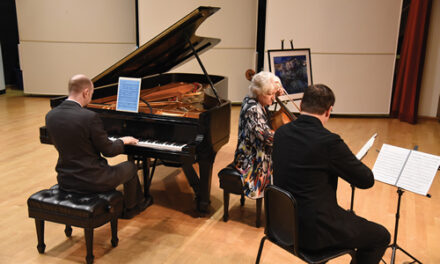After a brief workshopping rehearsal period, Deep Dish Theater Company opened a world premiere work this weekend at its theater in University Mall, Chapel Hill. The playwright, Joel Drake Johnson, was present during the rehearsal period and will return to Deep Dish in November for dialogues with audiences. He is the author of Four Places, first produced in Chicago where Johnson resides, and also of The Fall to Earth, a Steppenwolf Theatre Company premiere.
This latest work, A Queer Kiss, focuses on the event and aftermath of an almost anticlimactic kiss between two high school students. The event itself was quiet and unobtrusive, and pleasant for both. The rub of the matter is that they were both boys. That, and the fact that even though he was the aggressor, Bret recoils at the aftermath — that Scott writes him a love letter that night from his tablet. Bret accosts Scott the next day and swears that if word ever gets out, Bret will kill him.
It is this aftermath that drives the rest of the play. Johnson populates his work with a simple six characters: the two boys and their respective sets of parents. Each set has a quagmire to deal with; each boy handles the kiss and its repercussions differently, but neither well. Scott (Matthew Hager) and his mother, Lynn (MaryKate Cunningham), spend a sleepless night as Scott admits a desire for suicide. Lynn then decides to enlist Scott’s estranged father, Rich (Jonathan Leinbach), which only serves to alienate the boy.
Bret’s family is no better off. Bret’s mother, Cheryl (Catherine Rodgers), cannot reach her son anymore — for the past 16 months, as she points out. Bret (Daniel Doyle) is churlish, even disrespectful, to his mother. He locks himself in his room and refuses to communicate, except under extreme duress. Will, Bret’s dad (Tony Lea), while very much on the scene, is a source of fear for Bret and his inclusion in this situation tends to exacerbate, rather than calm, the problem.
The result of these two households’ problems is that very little gets done to alleviate the situation. The question uppermost in the parents’ minds is, “Are you gay?” Since both boys swear they are not, this only fuels the fire. Both boys are afraid of their fathers, though Scott fears an actual attack from his father, whereas Bret merely fears his father’s alienation. It is interesting to note here that, even though Rich is far angrier towards Scott than Will is to Bret, it is Bret who is actually struck by his father.
As each family tries in vain to deal with the situation, we see the complex and interesting way in which the set drives the play. Stage right is Bret’s room, a disaster area; stage left is Scott’s, very neat. Center stage is a multipurpose piece of furniture that serves as everything from a school’s rehearsal hall to one or the other parents’ beds. This central locale is quite adroitly handled by this structure and the cast’s abilities to manipulate it. It is liquid and solid simultaneously, causing the shift in scene without requiring a complete set change. This structure is the brain child of set designer Miyuki Su, and it handles multiple scene changes with the smallest amount of fuss.
But the real crux of this play is the interaction of six simple and really unexceptional people, as they each try, somewhat clumsily, to deal with what has become the elephant in the room. Hager’s Scott is, if anyone is, the central character of the work; his actions and his reactions, especially to his father, were deep and well-grounded, and he was acutely aware of his surroundings and the mess his character finds himself in. As Bret, Doyle seemed to be the more iconistic of the pair, an angry and disrespectful teen that drives his parents to distraction.
But equally astonishing as the boys were the parents; these four exhibited real trepidation and angst over their sons’ predicament. MaryKate Cunningham was the mother bear who must protect her young son. Catherine Rodgers was a mother who is left completely at a loss and fearful that her son is unreachable. Jonathan Leinbach as Rich seemed to have the easiest time of it in that he was the unyielding, angry father, but that may simply be a tribute to his abilities as an actor. And Tony Lea, who is a chameleon, nailed Will as a man conflicted by opposing forces.
These six actors created a tension that was palpable and a dilemma that was concrete. They interacted beautifully, recreating scenes that were true and heart-wrenching as the two families are drawn together and eventually torn apart by this queer kiss. Paul Frellick, Deep Dish’s artistic director, has directed A Queer Kiss so it exists in reality: scenes are true-to-life and painfully real. This world premiere asks questions that may have been asked before, but Johnson’s answers are more real than most. This is a reality check on life as teens and as parents, and we are as anxious as these characters on exactly how we are to deal with it.
A Queer Kiss continues through Saturday, November 16. For more details on this production, please view the sidebar.
Editor’s Note: Matthew Hager is CVNC‘s calendar guru and theatre editor but he played no role in the production of this review!











